Bill Gates’ Support for Lab Research on Genetic Modification of Gram-Negative Organisms
One area that Bill Gates has shown a keen interest in is the development of genetically modified Gram-negative organisms. But what exactly are these organisms, and how could they shape the future?
Wolbachia is a type of bacteria that is commonly found in insects, including mosquitoes. While Wolbachia can be beneficial in some cases, such as reducing the spread of mosquito-borne diseases like dengue fever and Zika virus, there are also potential risks associated with genetically modified Wolbachia mosquitoes. In this article, we will explore the disadvantages of using genetically modified Wolbachia mosquitoes and the potential impact they could have on humans.
Types of gram-negative bacteria:

Wolbachia is a genus of gram-negative bacteria infecting many species of arthropods and filarial nematodes. The symbiotic relationship ranges from parasitism to obligate mutualism. It is one of the most common parasitic microbes of arthropods, and is possibly the most widespread reproductive parasite bacterium in the biosphere.
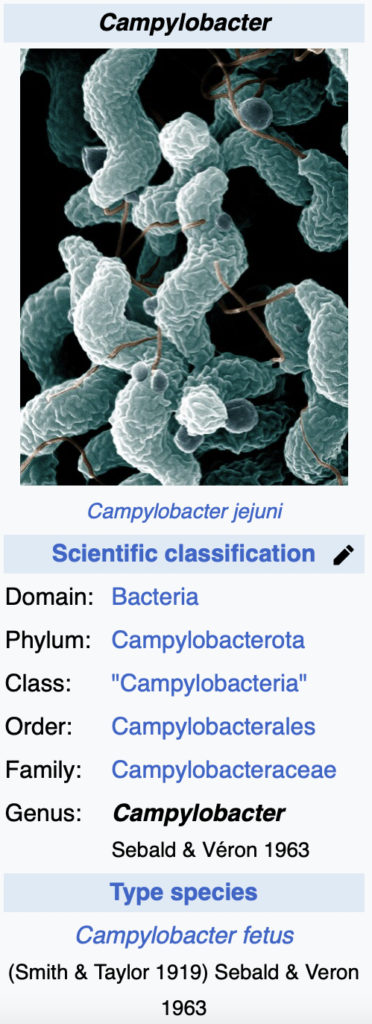
Campylobacter is a type of bacteria that can cause a diarrheal disease in people. Its name means “curved bacteria”, as the germ typically appears in a comma or “s” shape. According to its scientific classification, it is a genus of gram-negative bacteria that is motile.
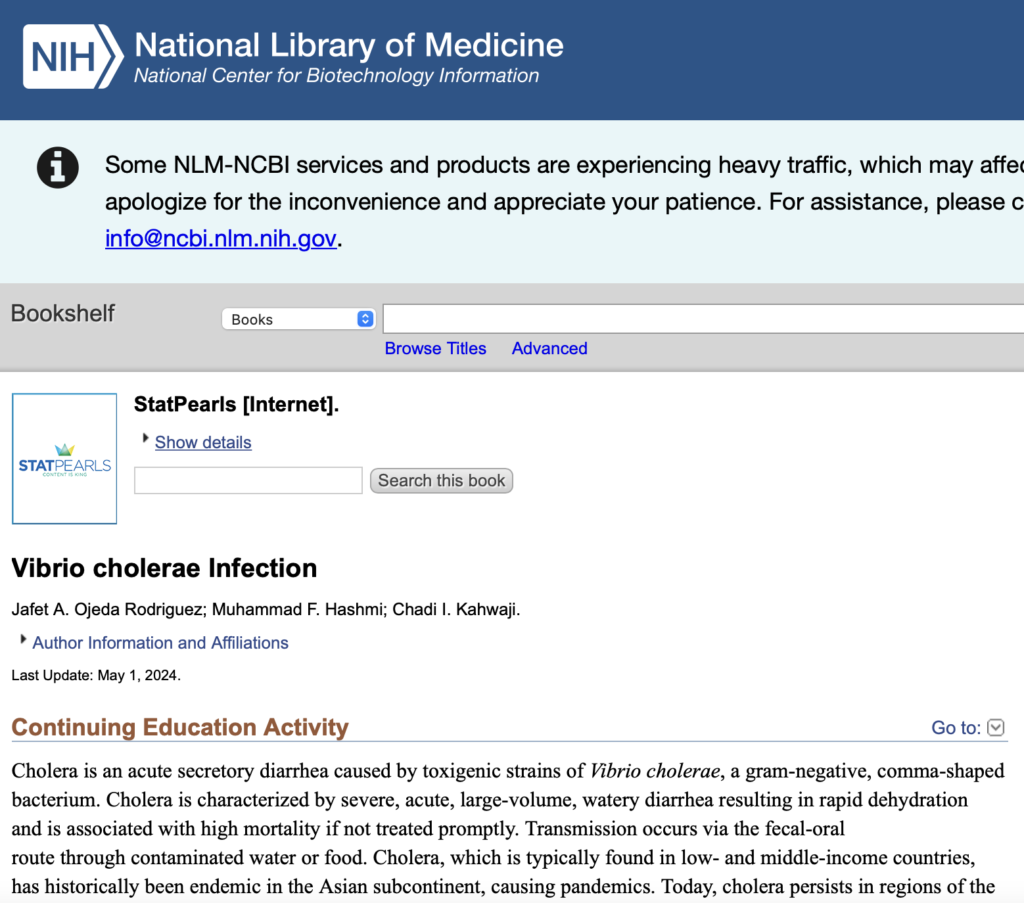
Cholera is an acute secretory diarrhea caused by toxigenic strains of Vibrio cholerae,a gram-negative, comma-shaped bacterium.
Genetically modified Gram-negative organisms, such as certain strains of bacteria, can pose significant risks to human health. These organisms are engineered to produce specific proteins or compounds that can be harmful when consumed. For example, some genetically modified bacteria are designed to produce toxins that can cause food poisoning or other serious illnesses.
When these genetically modified organisms are introduced into the environment, there is a risk that they could contaminate food sources and water supplies. This can lead to widespread exposure to potentially harmful substances, putting human health at risk. Additionally, there is concern that GMOs could lead to the development of antibiotic-resistant bacteria, making it more difficult to treat bacterial infections in the future.
One of the main concerns surrounding genetically modified Gram-negative organisms is their safety for human consumption. While regulatory agencies like the FDA claim that GMOs are safe to eat, critics argue that there is not enough long-term research to support this claim. In fact, some studies have suggested that GMOs could have negative effects on human health, such as allergies, organ damage, and reproductive issues.
It is important to note that GMO labeling laws vary from country to country, making it difficult for consumers to know whether the foods they are eating contain genetically modified organisms. This lack of transparency raises questions about the potential risks associated with consuming GMOs and the need for further research into their long-term effects on human health.
The Risks of Genetically Modified Wolbachia Mosquitoes
Genetically modified Wolbachia mosquitoes are engineered to carry a specific strain of Wolbachia that is intended to sterilize or kill off mosquito populations. While this may seem like a promising solution to control mosquito populations and reduce the spread of diseases, there are several potential risks associated with this approach.
- Unknown long-term effects: One of the major concerns about genetically modified Wolbachia mosquitoes is the lack of understanding of their long-term effects on the environment and human health. Since Wolbachia is believed to exhibit a considerable amount of horizontal gene transfer between itself and its host’s genetic material, there is a possibility that these modified mosquitoes could have unintended consequences.
- Potential for genetic mutations: The scenario mentioned in the introduction, involving genetically modified Wolbachia mosquitoes coming into contact with a virulent airborne form of sinus bacteria, highlights the potential for genetic mutations. This could result in the creation of new, more dangerous pathogens that could pose a threat to human populations.
- Loss of biodiversity: Introducing genetically modified Wolbachia mosquitoes into the environment could also have unintended consequences on local ecosystems. By targeting specific mosquito species, there is a risk of disrupting the natural balance of the ecosystem and causing harm to other organisms that rely on mosquitoes for food.
- Resistance development: Another concern with genetically modified Wolbachia mosquitoes is the potential for mosquitoes to develop resistance to the engineered Wolbachia strain. This could render the control method ineffective and lead to an increase in mosquito populations that are resistant to traditional insecticides.
If Wolbachia were to transfer genes to humans that could lead to the spread of infectious diseases, the consequences could be dire. Public health systems would be put to the test, and the resulting epidemic could have far-reaching effects on society as a whole.
Outside of insects, Wolbachia infects a variety of isopod species, spiders, mites, and many species of filarial nematodes (a type of parasitic worm), including those causing onchocerciasis (river blindness) and elephantiasis in humans, as well as heartworms in dogs.
Ref: http://www.courtofrecord.org.uk/archive/Wolbachia.html
Why I Gave My Blood to Defeat Dengue By Bill Gates
Working with local communities, researchers first released Wolbachia Wolbachia mosquitoes in Australia in 2011. In January, with the support of the government and residents, the Indonesian team began releasing mosquitoes in neighborhoods around Yogyakarta. During my visit, I had a chance to release dozens of the Wolbachia mosquitoes into the wild.
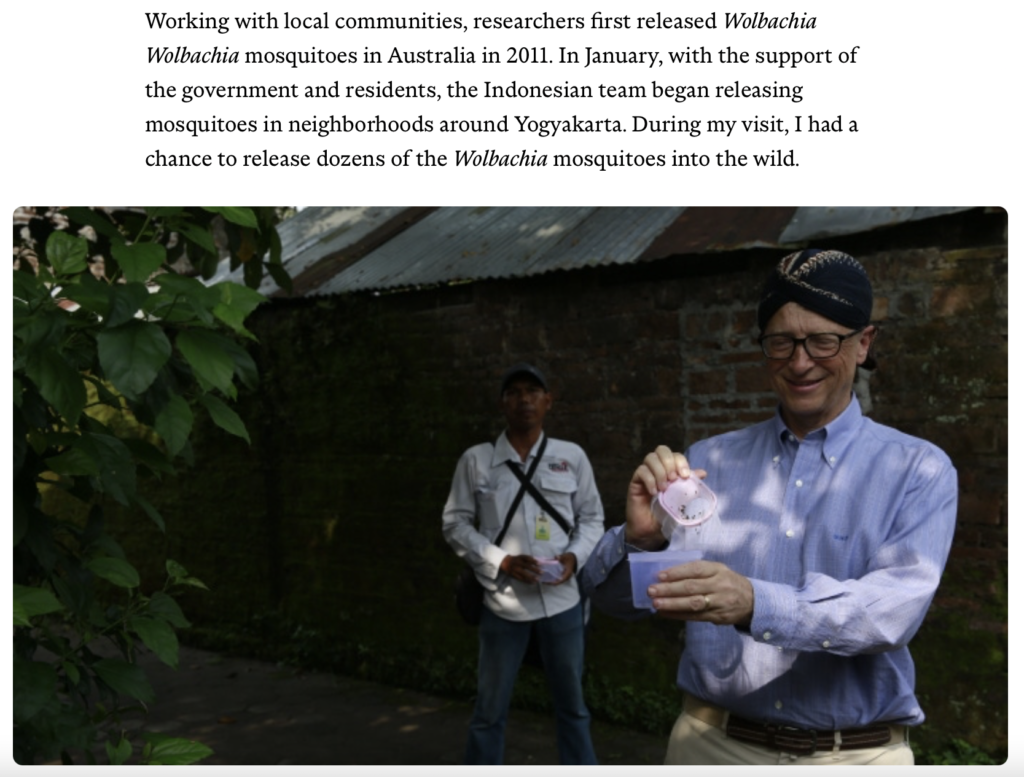
The university’s researchers are involved in a global effort to explore the potential of Wolbachia, a bacterium, in the fight against dengue fever. The Aedes aegypti mosquito, the main carrier of dengue, does not naturally contain Wolbachia. Yet, a group of scientists has discovered a groundbreaking method to infect these mosquitoes with this bacterium.
Breeding 30 million Wolbachia mosquitoes a week | Bill Gates
This factory is real.
According to Bill Gates, the mosquitoes that are being introduced do not pose a danger to the residents. On the contrary, they are instrumental in protecting and improving the lives of millions. However, let’s explore the truth behind this statement.
Disadvantages of Genetically Modified Mosquitoes:
There are serious concerns regarding the potential for GMO mosquitoes to carry or develop unknown pathogens that could harm humans.
Critics argue that the level of testing and observation conducted on these modified mosquitoes is inadequate.
Although these mosquitoes are an introduced species, they have become essential for the diet of native species.
There is also a risk that these GMO mosquitoes could mutate into a stronger variant capable of reproduction, which would introduce a new level of danger.
Despite claims to the contrary, the introduction of GMO mosquitoes into the environment is set to proceed.
Spraying will be limited to areas where humans reside, thereby reducing the impact of insecticides.
With most pesticides considered safe by government researchers, why gamble with the release of GMOs? There is a legitimate fear that some of the GMO mosquitoes will survive to adulthood and breed, undermining the intended effects of the modification.
Furthermore, the costs associated with producing GMO mosquitoes are excessively high and time-consuming. We already have numerous effective strategies for mosquito control and personal protection, including the use of Mosquito Magnet® traps.
Ethical issues at the level of the individual, community, and environment
Individual consent: Do individuals have the right to decide if they want to be near GM mosquitoes? We need to think about how this personal choice fits in with keeping the community healthy. Should only people in research studies have to give their consent?
Community consent: Should the local community get to say yes or no to testing GM mosquitoes in their area? How can scientists or health officials work with the people living there? Also, should outside groups that don’t support genetically modified organisms be able to stop the community from using a method
Public health benefits and risks: What are the pros and cons for public health related to the experiments with genetically modified mosquitoes? How should we look at the benefits compared to the risks involved?
Environmental risks: What could happen to the environment if we test GM mosquitoes in a field trial? How can we check these effects? Is it okay to prioritize public health over the environment? Does releasing GM mosquitoes into the wild create a risky situation for environmental policies?
The dangers of genetically modified Gram-negative organisms and their impact on human health should not be taken lightly.
15 Super Home Remedies to Kill Mosquito Larvae in Water
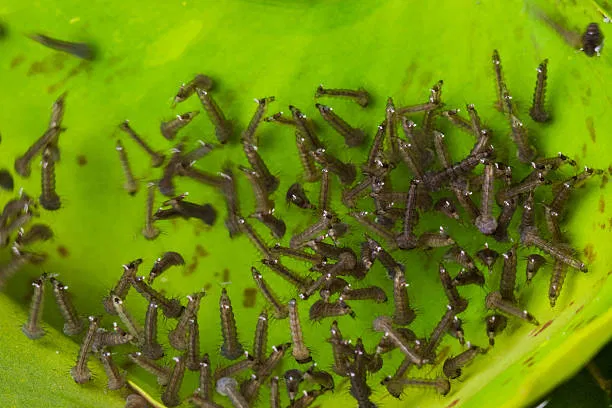
What are Mosquito Larvae?
Female mosquitoes lay their eggs in standing, stagnant water. They later hatch and develop into larvae. If you’re unable to control their population, they will soon become adult mosquitoes and wreak havoc in your home and garden.
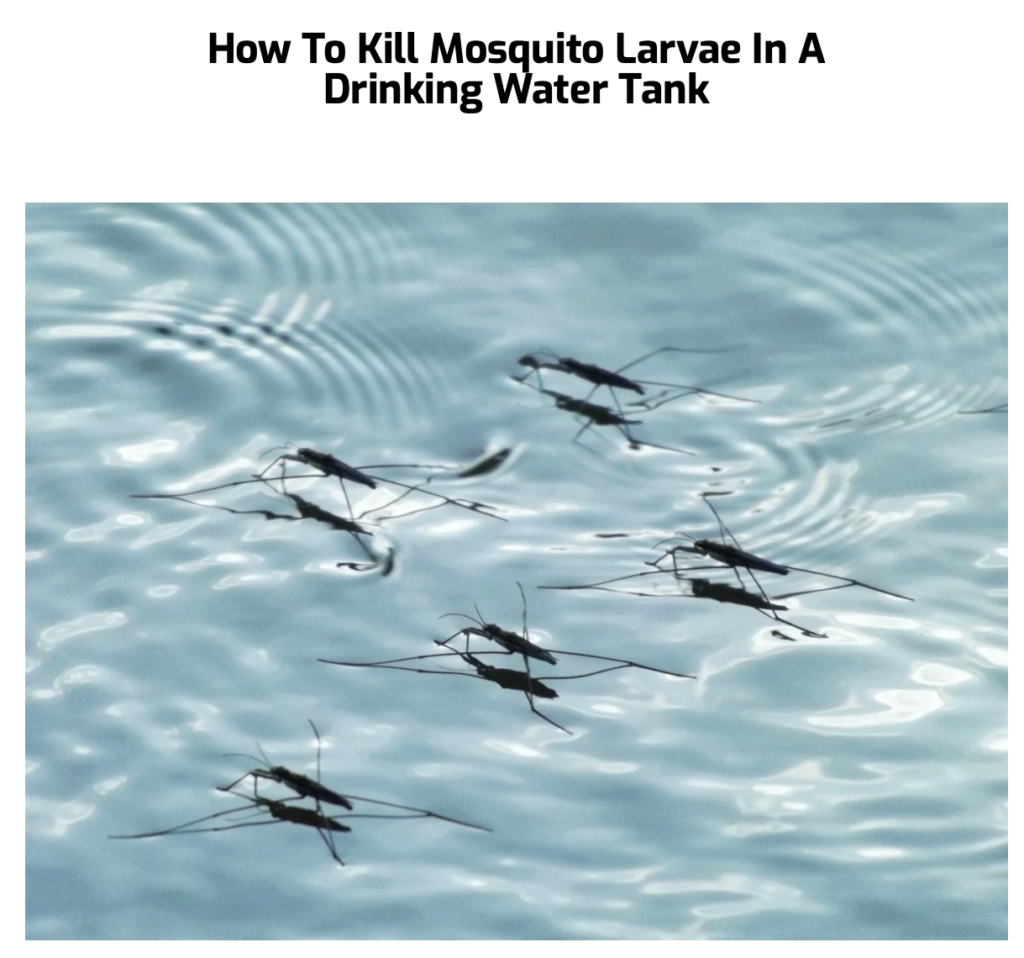
Drinking water tanks containing standing water can become a breeding site for mosquitoes, who lay their eggs in the water. The eggs soon hatch and become larval ‘nymphs’, the next stage of the mosquito’s life cycle. If those larvae are left to grow unchecked, they quickly develop into adult mosquitoes.
Source: Wikipedia -Image- Facebook
Also Read:
